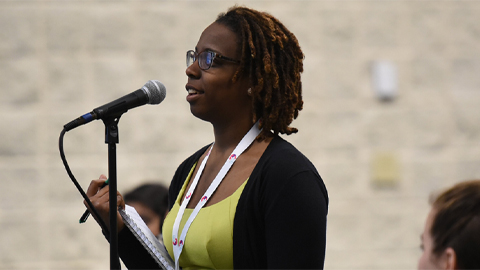What not to expect from Trump’s State of the Union address tonight
This evening, President Donald Trump will give his third State of the Union address before a joint session of Congress. The constitutionally mandated address usually serves as a preview of a president’s foreign and domestic policy agenda for the year ahead, and it often comes around the same time as the release of the president’s annual budget request. If past as prologue, the scientific community is likely to find Trump’s address disappointing. While he has spoken more than 16,000 words in his previous three addresses, he has mentioned or referenced science only six times.
New episode
ASBMB Public Affairs Director Benjamin Corb talks about what President Donald Trump's State of the Union address will likely cover — and what he wishes it would cover. Listen or download.
Trump’s opinion of science has been reflected in his budget requests since taking office in January 2017. Although the National Institutes of Health has received billions of dollars in increases during his administration, those increases came from Congress — and they came in spite of Trump’s calls to cut funding at the NIH and most other science-funding agencies in every single one of his budget requests. (When the president last month tried to take credit for the steady drop in cancer-related deaths in the United States, the fact-checkers were quick to point out that he’d asked for $4.5 billion in cuts from the NIH last year.)
Beyond funding, there are policy decisions that tell the story of this administration’s views of science and scientists.
- Seven days after taking office, Trump issued the first of several executive orders and proclamations closing America’s borders to people from predominantly Muslim nations. One of the effects was that scientists from those nations were prevented from attending conferences in the U.S.
- Before Trump nominated Kelvin Droegemeier in August 2018 to be director of the White House Office of Science and Technology Policy, he’d kept the position vacant longer than any time in the history of the office.
- In June, the administration announced it would move two U.S. Department of Agriculture research institutes from the D.C. area to Kansas. The Washington Post editorial board said the decision “suggests an intention by the administration to encourage qualified analysts to leave government and stifle independent and objective research.”
- Indeed, in December, the New York Times published a detailed report on how the administration has worked to reduce the role that federal scientists play in policymaking.
No, we shouldn’t expect the president to make many references to science tonight, but that will not change our focus or determination to advocate on behalf of you. We will continue to build bipartisan support in Congress and advocate for science in all parts of government.
Related stories

Anti-globalization rhetoric threatens scientific and technological progress: The U.S. depends on international collaborations and immigrants to solve domestic and global problems.
Trump’s travel ban: Lana Saleh of New England Biolabs shared her immigration story as the effects of Trump's travel bans emerged.
The travel ban is why I can’t be at the ASBMB annual meeting: An ASBMB travel award winner found himself the target of the travel ban.
Enjoy reading ASBMB Today?
Become a member to receive the print edition monthly and the digital edition weekly.
Learn moreGet the latest from ASBMB Today
Enter your email address, and we’ll send you a weekly email with recent articles, interviews and more.
Latest in Policy
Policy highlights or most popular articles

National Academies propose initiative to sequence all RNA molecules
Unlocking the epitranscriptome could transform health, medicine, agriculture, energy and national security.

ATP delegates push for improved policies
This ASBMB program helps advocates gain skills to address issues that affect science and scientists.

Advocacy workshops at Discover BMB 2024
Topics include running for office, becoming an advocate, and navigating the grant review process at the NIH.

NIH’s advisory committee releases report on re-envisioning postdoc training
The working group developed six primary recommendations for the National Institutes of Health.

When authoritative sources hold onto bad data
A legal scholar explains the need for government databases to retract information.

Can science publishing be both open and equitable?
An updated memo from the White House Office of Science and Technology Policy has researchers, funders and publishers looking ahead

